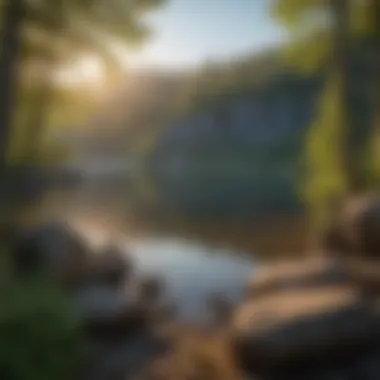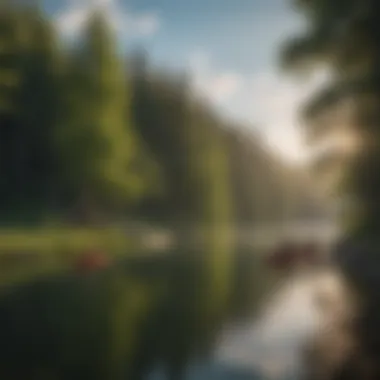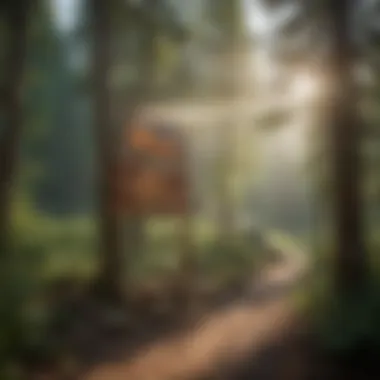Devils Lake Campground: A Natural Retreat for All


Intro
Devils Lake Campground is a hidden gem that serves as a pivotal site for both recreation and ecological education. Nestled in woodlands rich with life, it beckons outdoor enthusiasts and nature lovers. The campground stands out, not just for its beauty but also for its significant role in promoting sustainable practices in forestry and conservation efforts.
In this exploration, we will dive into various facets that make Devils Lake Campground a noteworthy destination. From the essential ecology and biodiversity surrounding the area to the sustainable forestry practices that maintain its health, the campground proves to be a model for responsible outdoor engagement. We will also assess how community involvement enhances the campground's role in ecological stewardship. By understanding these elements, we aim to underscore the importance of this natural haven in fostering both leisure activities and environmental responsibility.
Overview of Devils Lake Campground
Devils Lake Campground represents a significant intersection of natural beauty and recreational opportunity. Nestled within a picturesque landscape, it serves not only as a campsite but also as a hub for ecological education and community engagement. Understanding this campground's features reveals much about its role in promoting sustainability and environmental stewardship.
Geographical Location
The Devils Lake Campground is located in the heart of a unique ecological zone, surrounded by stunning forest and water landscapes. More specifically, it sits at the edge of Devils Lake, a large body of water that attracts various species of birds and wildlife. The geographical coordinates mark it in the northwestern part of the country, making it accessible for various regional visitors.
The positioning of the campground allows for easy access to both water-based and land-based recreational activities. This prime location enhances its appeal as an outdoor destination for families, nature enthusiasts, and conservation-minded visitors alike. The proximity to urban centers means that it can serve as a quick getaway for those looking to immerse themselves in nature without extensive travel.
Historical Significance
The historical significance of Devils Lake Campground is tied closely to the broader narrative of natural preservation and outdoor recreation in the region. This campground is established on land that has been treasured for generations, embodying stories of cultural heritage, indigenous practices, and environmental conservation efforts.
Historically, the area around Devils Lake provided sustenance and spiritual significance for local native communities. As time progressed, the land’s purpose transitioned into one of recreation and preservation. The campground now stands as a testament to both the history of land use and the evolution of conservation practices. Visitors often find information plaques and guided tours that educate them on the area’s history, thus fostering a deeper appreciation for the landscape they enjoy today.
In summary, the overview of Devils Lake Campground highlights its geographical advantages and rich historical roots. These elements are essential for understanding its current role as a hub for ecological awareness and recreational activities.
Ecological Profile
The ecological profile of Devils Lake Campground is crucial to understanding its role not just as a recreational site, but as a steward of the environment. This section highlights various elements that define the rich biodiversity found in and around the campground. The profile assists visitors, as well as forestry professionals, in recognizing the importance of maintaining this ecosystem.
Devils Lake Campground plays an essential part in habitat preservation and ecological balance. This area not only supports myriad plant and animal species, but it also demonstrates essential practices in conservation and sustainable land use. Understanding the flora and fauna is vital for appreciating the campground’s natural value. Visitors can also gain insights into the interconnectedness of species and the environment, leading to deeper, more meaningful experiences in nature.
Flora of the Area
The flora within Devils Lake Campground comprises a diverse array of plant life. The region is predominantly covered with hardwood and coniferous trees. Species such as oak, maple, and pine dominate the landscape. These trees provide critical shade and shelter for various types of wildlife.
In addition to trees, various shrubs, wildflowers, and grasses thrive here. Native species tend to flourish, as they are well adapted to the local soil and climate conditions. Notable plants include:
- Wild Blueberry: Found in abundance, they attract numerous birds and insects.
- Rhododendron: This flowering shrub adds beauty and diversity to the underbrush.
- Ferns: They create a unique ground cover that helps in soil stabilization.
Understanding these plant species not only enriches the visitor's experience but also enhances ecological awareness and appreciation for natural habitats.
Fauna: Wildlife Encounters
The fauna at Devils Lake Campground provides a chance for wildlife enthusiasts to observe various animal species in their natural habitat. Mammals like deer, squirrels, and raccoons are commonly sighted, while birds abound, ranging from songbirds to larger raptors. The presence of such wildlife indicates a robust and healthy ecosystem, as these animals depend on the campground's flora for food and shelter.
Visitors may encounter:
- White-tailed Deer: Often seen grazing during early morning or late evening.
- Eastern Bluebird: Known for their vivid plumage, they fill the air with melodic calls.
- American Black Bear: Rare, but sightings can create unforgettable moments for those fortunate enough.


Wildlife observation opportunities not only educate campers about species interactions but also emphasize the need for responsible camping habits to protect these animals.
Environmental Challenges
Despite its natural beauty, Devils Lake Campground faces significant environmental challenges. Climate change, invasive species, and human activity threaten the integrity of the ecosystem.
Some notable challenges include:
- Invasive Plants: Species such as Japanese Knotweed can outcompete native flora, disrupting the habitat.
- Pollution: Runoff from nearby areas can impact water quality, affecting both plants and wildlife.
- Climate Variability: Changes in temperature and precipitation impact species migration and plant growth cycles.
Addressing these challenges involves proactive measures. Support for conservation programs and sustainable practices can help mitigate some of the impacts. Education about these challenges also promotes responsible behaviors among visitors, ensuring the longevity of the campground’s ecological profile.
"Understanding the ecological profile of Devils Lake Campground is crucial for sustaining its biodiversity and natural beauty. Every visitor plays a role in its preservation."
In summary, the ecological profile of Devils Lake Campground is not only about the beauty of its landscape. It is a critical foundation for cultivating a deeper appreciation for the environment. This awareness can inspire actions that contribute to long-term ecological integrity.
Camping Facilities
The quality and range of camping facilities at Devils Lake Campground plays an essential role in the overall visitor experience. Well-designed amenities not only enhance comfort but also promote safety and encourage sustainable practices. It is vital that these facilities are tailored to meet the needs of both casual visitors and outdoor enthusiasts, ensuring a welcoming environment while maintaining the natural integrity of the area.
Site Amenities and Services
At Devils Lake Campground, there is a focused effort on providing essential amenities to campers. The facilities include well-maintained restrooms equipped with flushing toilets and handwashing stations. Picnic tables are available at each campsite, allowing visitors to enjoy meals outdoors. Fire pits are also provided, giving campers a place to gather and prepare food, while also contributing to the overall camping experience. Moreover, convenient trash disposal receptacles are strategically placed to encourage waste management compliance.
Water availability is another integral service. Drinking water is accessible from a central source, which is essential for hydration, especially during warm weather. This water is regularly tested to ensure safety and compliance with health standards. Additionally, the campground features a small convenience store where essential supplies can be purchased, enhancing the convenience for campers who may have forgotten items or need additional provisions.
Each of these amenities contributes to a safer and more enjoyable camping experience. As such, they should be maintained and regularly updated to meet the needs of a diverse range of visitors.
Accessibility Features
Accessibility is a fundamental aspect in modern campground design, and Devils Lake Campground recognizes this through various features that cater to visitors with mobility challenges. The layouts of the campgrounds are thoughtfully designed to ensure that pathways are firm and level, facilitating easier navigation through the area.
Accessible restroom facilities allow individuals with disabilities to utilize the amenities comfortably. Moreover, some campsites are specifically equipped with features such as reinforced surfaces and closer proximity to restrooms and common areas.
Additional assistance may include options for designated parking and readily available information on accessibility via official resources or staff on site. These features ensure that the campground remains inclusive, allowing everyone to appreciate the natural beauty inherent to Devils Lake.
As accessibility becomes an increasingly essential consideration in public spaces, the efforts made by Devils Lake Campground serve as a positive model for others to emulate.
"A well-equipped campground not only enhances the visitor experience but also contributes to the sustainability of natural spaces."
Recreation Opportunities
Recreation opportunities at Devils Lake Campground play a vital role in attracting visitors while also contributing to their understanding of nature. Engaging in outdoor activities in this natural setting not only provides enjoyment but also fosters a deeper connection to the environment. The campground offers a diverse range of recreational options that cater to various interests and skill levels. This section looks at hiking, water activities, and wildlife observation, highlighting their significance and attracting ecological awareness.
Hiking Trails
Hiking trails around Devils Lake Campground are among the most notable features. These paths meander through diverse landscapes, presenting a rich variety of flora and fauna along the way. Different trails serve multiple purposes: some are designed for leisurely strolls, while others cater to more experienced hikers seeking a challenge. Visitors can enjoy panoramic views, seasonal wildflower displays, and opportunities to explore various ecosystems.
Safety is essential when venturing out. Hikers should be aware of their level of fitness and choose appropriate trails. It is recommended to have maps or digital guides to stay on course and ensure a safe return. Exploring paths like the North Shore Trail or the more strenuous Cedar Point Loop can enhance the camping experience and provide lasting memories.


Water Activities
The proximity of Devils Lake to various water bodies offers numerous aquatic activities. Swimming, kayaking, and canoeing are popular options for those looking to immerse themselves in a refreshing environment. These water activities not only promote physical well-being but also contribute to mental relaxation and enjoyment.
Fishing is another prevalent pursuit. Species such as trout and bass draw anglers seeking solitude or a family adventure. However, adhering to local regulations is necessary to maintain environmental integrity and protect aquatic life. Visitors should also consider the impact of their activities on the lake's ecosystem.
Wildlife Observation
Wildlife observation is a rewarding aspect of visiting Devils Lake Campground. The area supports diverse species, providing ample opportunities to view animals in their natural habitats. Birdwatchers will find pleasure in spotting various species, including the majestic bald eagle or the elusive great horned owl.
For those keen on observing larger mammals, patience is essential. Animals like deer or even the occasional black bear may appear, particularly at dawn or dusk. Using binoculars or a camera can enhance the experience while maintaining a safe distance from the wildlife. Engaging with local educational programs can deepen knowledge about these species and the ecosystems they inhabit.
"Engaging actively with the environment allows for a more profound appreciation of natural harmony and conservation efforts."
Sustainable Practices at the Campground
Sustainable practices play a crucial role in preserving the ecological integrity of Devils Lake Campground. As more visitors flock to natural reserves, the balance between human activity and environmental conservation becomes increasingly vital. These practices not only protect the area’s unique ecosystems but also enhance the experience for visitors who seek a connection with nature. By implementing sustainable initiatives, the campground aims to minimize its ecological footprint and promote environmental awareness among its users.
Waste Management Initiatives
At Devils Lake Campground, waste management is approached with critical attention to detail. Recognizing the impact of waste on the environment, the campground has established several initiatives:
- Recycling Programs: Visitors are encouraged to separate recyclable materials. Bins for plastics, paper, and metals are strategically placed throughout the campground.
- Composting: Organic waste, such as food scraps and yard waste, is collected and composted. This reduces landfill contributions and creates nutrient-rich compost for local vegetation.
- Educational Signage: Informative signs about waste disposal are installed to guide campers in understanding proper waste management practices.
Through these initiatives, the campground not only reduces waste but also educates visitors on responsible practices that they can implement in their own lives.
Conservation Programs
Conservation programs at Devils Lake Campground are integral to its mission of environmental stewardship. These programs focus on protecting natural resources and promoting biodiversity within the campground’s ecosystem. Some key aspects include:
- Habitat Restoration: Efforts are ongoing to restore native habitats that have been affected by invasive species. Volunteers work diligently to remove non-native plants and reintroduce indigenous flora. This helps to maintain biodiversity and support local wildlife.
- Wildlife Monitoring: Regular monitoring of wildlife populations ensures that species dynamics are tracked. This data informs conservation strategies and aids in making informed decisions about habitat management.
- Community Involvement: The campground engages local communities in conservation efforts, fostering a sense of shared responsibility. Workshops are held to educate participants about local ecology and the importance of preserving natural habitats.
"Conservation is a community effort. Everyone has a role to play in protecting our natural resources."
In summary, sustainable practices at Devils Lake Campground encompass waste management and conservation programs. These efforts reflect a commitment to preserving the environment while enhancing the experience for all who visit. Continued focus on these initiatives is essential for the long-term health of the campground and its ecosystems.
Community Engagement
Community engagement plays a crucial role at Devils Lake Campground, contributing significantly to its sustainability and enhancing the visitor experience. By fostering relationships between campers, local communities, and environmental organizations, the campground becomes a vibrant hub for both recreation and conservation efforts. Engaging the community allows for a deeper understanding of the natural environment and ensures that efforts are made to preserve the beauty and integrity of the area.
Active participation in campground activities helps to connect individuals with nature. People become more aware of their ecological footprints and learn the importance of leaving no trace. The campground offers various opportunities, from volunteering in clean-up events to participating in educational workshops. Each activity supports the campground’s mission to promote ecological stewardship.
Volunteering Opportunities
Volunteering at Devils Lake Campground offers a unique avenue for community members to contribute actively to the preservation of this natural haven. Various programs are in place, allowing individuals to assist in park maintenance, habitat restoration, and educational outreach. Engaging in these activities not only helps maintain the park but also strengthens community ties.
Some common volunteering opportunities include:


- Trail Maintenance: Volunteers help keep hiking paths clear and well maintained, ensuring that visitors can enjoy the natural beauty safely.
- Wildlife Monitoring: Participation in wildlife monitoring can enhance understanding of local species and their habitats, promoting awareness of ecological dynamics.
- Special Events: The campground hosts community events throughout the year. Volunteers play vital roles in organizing and executing these events, fostering community spirit and nature appreciation.
Engagement in volunteer programs provides hands-on experience with environmental stewardship, ensuring the campground remains a place where nature thrives.
Educational Workshops and Events
Educational workshops at Devils Lake Campground are designed to cultivate knowledge and appreciation for the surrounding ecosystem. These events serve multiple functions, from informing the public about local flora and fauna to teaching sustainable camping practices. They offer participants the tools to engage with nature in a mindful and responsible manner.
Workshops may cover subject areas such as:
- Nature Conservation: Understanding how to protect the environment and maintain biodiversity.
- Camping Techniques: Learning best practices for camping, including fire safety, food storage, and waste reduction.
- Flora and Fauna Tours: Guided tours expand knowledge about the specific plants and animals native to Devils Lake, promoting deeper respect for these species.
Through these educational offerings, the campground not only enhances visitor experience but also cultivates a sense of responsibility towards environmental conservation. By engaging with both the ecological and community aspects, Devils Lake Campground becomes more than just a recreational destination; it evolves into a platform for lifelong learning and ecological advocacy.
Visitor Guidelines
Visitor guidelines are crucial for ensuring that everyone fully enjoys the beauty and serenity of Devils Lake Campground while minimizing their impact on the environment. By following these recommendations, visitors can help maintain the campground's ecological balance and enhance their own experience in the natural world.
Best Practices for Campers
When staying at Devils Lake Campground, adhering to best practices contributes to a positive experience. Key practices include:
- Leave No Trace: Always clean up after yourself. This means taking all trash, leftover food, and camping gear once you leave. Dispose of waste properly by using designated receptacles.
- Respect Wildlife: Observe animals from a distance. Feeding wildlife is prohibited as it can alter their natural behaviors and diet.
- Campfires: Use established fire rings for campfires. Keep fires small and completely extinguish them before leaving.
- Stay on Trails: Protect native flora by remaining on marked paths. This reduces damage to delicate ecosystems.
- Noise Management: Keep noise levels low to maintain the tranquility of the area.
By following these simple yet impactful guidelines, campers continue to enjoy nature while preserving it for future generations.
Safety Precautions
Safety is paramount while enjoying the outdoors. At Devils Lake Campground, visitors should be aware of potential hazards to ensure a safe visit. Important safety precautions include:
- Stay Aware of Weather Conditions: Weather can change rapidly. Prepare for rain, wind, or temperature shifts by checking forecasts before heading out.
- Wildlife Encounters: Familiarize yourself with the local wildlife, such as bears and snakes. Know how to react if you come across them. In case of a bear sighting, back away slowly and do not run.
- Emergency Kit: Always pack a basic first aid kit that includes essential supplies such as bandages, antiseptic wipes, and medications.
- Hydration: Keep ample water supply. Dehydration is dangerous, particularly during physical activities like hiking.
- Communication: Leave information about your camping plans with someone. In case of emergencies, having someone aware of your itinerary is crucial.
Following these safety precautions helps ensure a pleasant experience at Devils Lake Campground, allowing visitors to focus on enjoying their time in nature.
Future of Devils Lake Campground
The future of Devils Lake Campground is a topic of profound significance within the context of environmental sustainability and outdoor recreation. As more visitors seek refuge in nature, the campground faces both challenges and opportunities. Understanding these dynamics is essential for maintaining its delicate ecosystem while providing facilities that meet the needs of campers. The campground's future is not just about continuing existing practices; it is also about adapting to new environmental realities and the growing demand for outdoor experiences.
Upcoming Projects
Several upcoming projects aim to enhance the infrastructure and services at Devils Lake Campground. These projects align with sustainable practices and community engagement efforts. Key initiatives include:
- Trail Enhancements: Plans are underway to improve current hiking trails. This involves repairing wear and tear caused by foot traffic and providing better signage for safety and guidance.
- Eco-Friendly Facilities: New restrooms and shower facilities constructed with sustainable materials are scheduled for installation. This will ensure that amenities reflect the environmental ethos of the campground.
- Wildlife Habitat Restoration: In collaboration with local conservation groups, projects focused on restoring habitats for native wildlife species are being initiated. This will help bolster the biodiversity of the area.
These projects not only improve the visitor experience but also emphasize the campground's commitment to preserving its natural surroundings. Community input is crucial in these developments to ensure that all voices are heard.
Long-Term Conservation Goals
The long-term conservation goals for Devils Lake Campground are ambitious and necessary. They focus on the preservation of natural resources, maintaining environmental integrity, and fostering ecological resilience. Important goals include:
- Sustainable Resource Management: Implementing strategies to monitor and manage natural resources, such as water and soil health, will be vital. Regular assessments can guide conservation efforts and ensure resources remain abundant for future generations.
- Education and Awareness: Creating educational programs that inform visitors about ecological practices offers a way to engage the public. Workshops on topics like native plants, waste reduction, and wildlife preservation can heighten awareness and foster a culture of stewardship among visitors.
- Community Partnerships: Strengthening partnerships with local non-profits and educational institutions can lead to more effective conservation efforts. Collaborative projects might include research initiatives or volunteer restoration days.
The realization of these long-term goals hinges on the collaboration of many stakeholders, including visitors, local communities, and environmental organizations. A collective effort will be necessary to navigate the intricate relationship between recreation and conservation.
Successful conservation depends on our ability to envision a future where nature and recreation coexist harmoniously.















